- Home >
- Organika Dgl (Deglycyrrhizinated Licorice) 760mg - 100 Tabs + 100 Tabs (2 For Deal) - Organika
Dgl (Deglycyrrhizinated Licorice) 760mg - 100 Tabs + 100 Tabs (2 For Deal) - Organika
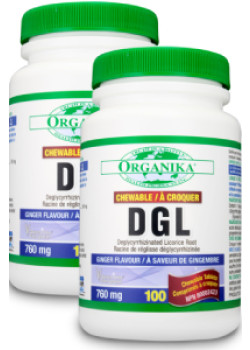
We're sorry, we no longer carry this item.
Check These out
Suggested, Similar, & Related Products:
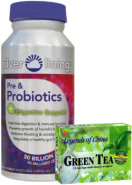
Sale: $37.99
Reg.: $44.99 (Save $7.00)
(Click Add to Select Bonus)
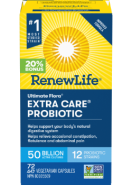
Sale: $54.99
Reg.: $69.99 (Save $15.00)
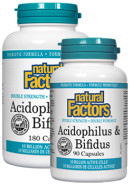
Sale: $26.99
Reg.: $44.99 (Save $18.00)
(Click Add to Select Bonus)
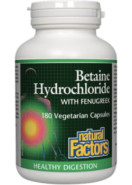
Sale: $17.99
Reg.: $26.99 (Save $9.00)
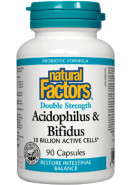
Sale: $10.99
Reg.: $12.99 (Save $2.00)
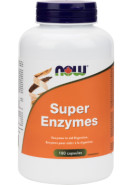
Sale: $34.99
Reg.: $54.99 (Save $20.00)
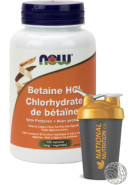
Sale: $24.99
Reg.: $29.99 (Save $5.00)
(Click Add to Select Bonus)
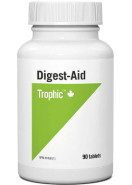
Sale: $14.95
Reg.: $18.99 (Save $4.04)
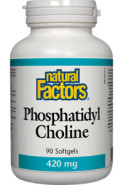
Sale: $12.49
Reg.: $16.99 (Save $4.50)
Or, Shop our Latest Deals:
Shop Now >- 760mg
- Deglycyrrhizinated (DGL)
(Licorice Root Powder)
- 15mg
- Ginger Root Powder
Stearic acid, fructose and sorbitol.
Format
 Tablets
Tablets
100 + 100
Dosage
Slowly chew 1 or 2 tablets 20 minutes before a meal, as a dietary supplement.
Important Information
Contains no salt, yeast, wheat, gluten, corn, soy, milk, egg, artificial preservatives, colours or sweeteners.
- Natural antacid to help soothe an overactive stomach.
- Anti-inflammatory, antimicrobial and antioxidant activities
- Helps protect stomach and intestinal lining.
- May be helpful for gastric or intestinal ulcers, heartburn and intestinal problems.
- Tasty licorice flavoured chewable tabs.
Related Videos
No Related VideosRelated Articles
Articles by a naturopathic doctor.
Organika, formulators of Canada’s best-selling Collagen and marine collagen and Bone Broth supports skin and joint health. Organika's health products also include; Organika spirulina, Chlorella, Curcumin to support inflammation, Organika Enhanced Collagen Protein, and Adaptogens to provide balance. Shop Organika here at National Nutrition.ca for quality, Canadian-made supplements.
What is DGL?
DGL or Deglycyrrhizinated Licorice Root is a natural antacid, where the glycirrhizinic acid component of the root has been removed. DGL may stimulate our bodies defense mechanisms resulting in improved quality of mucous, lengthening of intestinal cell life and enhanced microcirculation in the gastrointestinal lining. Deglycyrrhizinated licorice is a demulcent, an agent that coats and protects mucosal surfaces. In the stomach and intestines DGL licorice protects the lining from ulceration. It also stimulates mucus production thereby covering the irritated tissue so that it has a chance to heal.
Digestive Heath
The stomach can be afflicted with several common digestive concerns. Indigestion is caused by an inability to breakdown and absorb food. It is usually directly related to the type of food eaten and poor eating habits. Chronic indigestion may be related to lack of bile, stomach acid and enzymes, or food sensitivities. Gastric and peptic ulcers are erosions of the mucus membrane that line the stomach and upper intestine. Excess digestive juices, deficient digestive juices, bacteria, poor diet, caffeine, alcohol, tobacco, anti-inflammatory medication, cortisone and stress can cause ulcers. Hiatal hernias are a bulge of stomach tissue that have gone through the diaphragm and sit around the esophagus. It is associated with poor eating habits, obesity and the use of estrogen medications.
- Optimize the health and functioning of your stomach by:
- Steaming veggies and eating small frequent meals in a comfortable environment
- Eat slowly to avoid swallowing excess air. Do not drink liquids while eating because it dilutes digestive juices
- Eliminate all processed and refined foods from the diet. Other foods that irritate the stomach are alcohol, coffee, tea, colas, tobacco, aspirin, ibuprofen and spicy foods
- For ulcers, eat soothing foods that produce a protective coating over the digestive tract for example, ground flax seed, yogurt, porridge and congee
- Chewing food completely
- Supplementing with natural digestive aids when needed
One can eat the most nutritious food but if the intestinal membrane is not in good working order the body will not be able to absorb the nutrients. Diverticulitis occurs when the intestinal muscle tissue weakens, forms pouches and becomes inflamed. Crohn's Disease is an inflammation of the small intestine, but it can also affect the mouth and stomach. Ulcerative colitis occurs when small ulcers develop on the mucous lining of the large intestine. Irritable bowel syndrome mimics Crohn's disease and ulcerative colitis but does not make visible lesions in the bowel.
Ulcers
Gastric and peptic ulcers are erosions of the mucus membrane that line the stomach and upper intestine. Excess digestive juices, deficient digestive juices, bacteria, poor diet, caffeine, alcohol, tobacco, anti-inflammatory medication, cortisone and stress can cause ulcers.
General ulcer symptoms are a burning or gnawing pain in the upper abdomen, a hungry feeling, nausea and vomiting. Gastric ulcers usually cause pain while eating or soon after eating. This can lead to weight loss. Peptic ulcers are felt several hours after eating or in the middle of the night. Food helps to stop the pain. Complications of ulcers are perforation of the digestive tract, internal bleeding and anemia.
Conventional treatment of ulcers involves the use of antacids, antibiotics, cimetidine or ranitidine. Although these medications decrease the symptoms they do no fix the damaged tissue. They also have a variety of side effects including rebound acid production. Do not lie down after eating. Consume carrot and cabbage juices because they heal the mucosal lining.
Dietary Support
Fruits and vegetables that are usually well tolerated by ulcer patients include spinach, cucumber, avocado, cabbage, potato, banana, apple, melon and cantaloupe. Eat soothing foods that produce a protective coating over the digestive tract for example, ground flax seed, yogurt, porridge and congee. Consume fermented products like yogurt, kefir, quark, buttermilk and natural cheeses to replenish the friendly bacteria that assist with nutrient digestion.
Dietary change is often the only way to completely resolve an ulcer. Eliminate all processed and refined foods from the diet. Also avoid fatty, rich foods, vinegar, citrus fruits, plums, coffee and black tea. Cook all foods well and eat small frequent meals in a comfortable environment.
Decrease stress and deal with underlying emotional concerns that may be affecting the ulcers. Place a hot water bottle over the abdomen because warmth increases circulation to the area. Drink marshmallow or slippery elm tea to soothe the digestive tract but allow the tea to cool significantly before drinking.
- Reviews
- POST A NEW REVIEW
Tell everyone what you think about this item!















